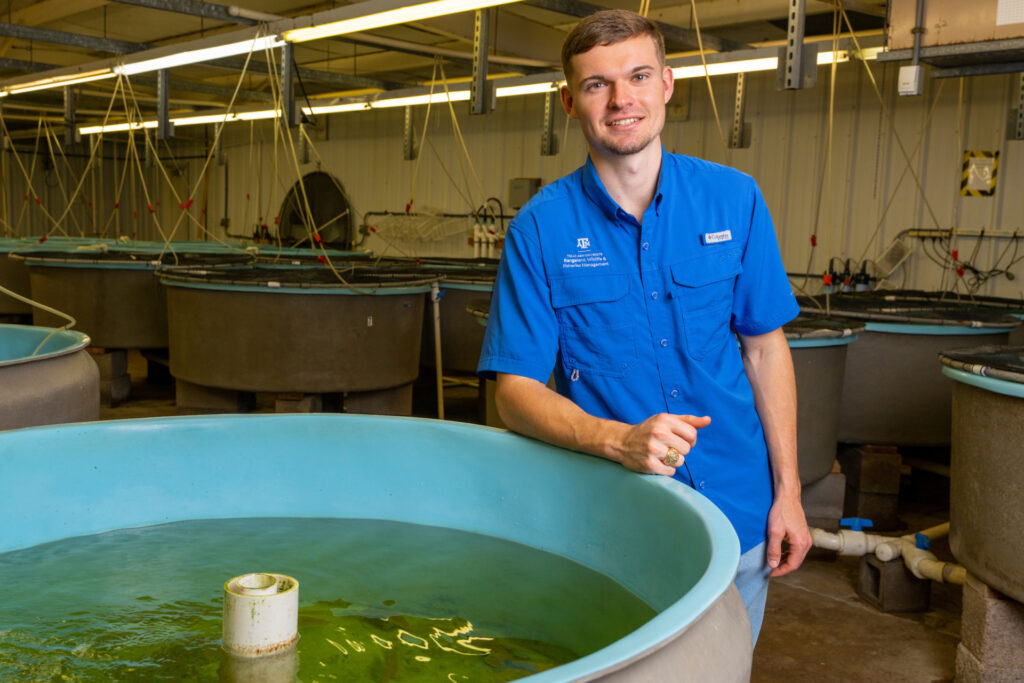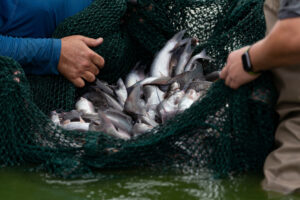AgriLife Extension adds fisheries management program specialist
Stamport to help landowners meet their fish production goals
Texas residents have a new fisheries management program specialist as a go-to resource for science-based recommendations regarding private ponds.

Texas A&M AgriLife Extension Service recently hired Garrett Stamport ’22 to help landowners with questions about stocking and managing fish in ponds and private lakes. He will be based at the Texas A&M AgriLife Research and Extension Center in Overton.
“Garrett is a welcomed addition to our department and will help landowners and operation managers make well-informed decisions about the resources they steward,” said Parr Rosson, associate head for AgriLife Extension in the Texas A&M College of Agriculture and Life Sciences Department of Rangeland, Wildlife and Fisheries Management.
About new pond management specialist
Stamport’s expertise will cover everything from water quality and fish stocking, harvest and management to establishing a proper environment and food chain to meet the landowner’s production goals, whether it is trophy fish or maximum harvestable production.
He graduated from Texas A&M University in December 2022 with a bachelor’s degree in fisheries, aquaculture and aquatic sciences from the Department of Rangeland, Wildlife and Fisheries Management. He served as a student technician at the Aquaculture Research and Teaching Facility under Todd Sink, Ph.D., AgriLife Extension aquaculture specialist and director of the Aquatic Diagnostics Laboratory, Bryan-College Station.
“I am looking forward to helping the public in any way I can,” Stamport said. “I want them to reach their goals for their ponds.”
Finding a passion for fisheries management
Stamport said he is focused on answering questions and providing recommendations, but that much of the job is dispelling myths and misconceptions about ponds and fish production. He said he understands how these fallacies take root and spread because he believed many of them until he learned the science of fisheries and aquatic management.
Growing up in a small town, hunting and fishing were his favorite ways to spend time. Fishing local ponds and lakes established his passion for fisheries. Stamport wanted to be an engineer when he arrived at Texas A&M, but an aquaculture meeting changed his academic trajectory.
Stamport met Bob Lusk, a nationally known fisheries biologist, at the meeting and left with an interest to learn more about the university’s fisheries program. He took a course, loved it and pursued his degree.
“It felt like a good fit because I love fishing,” he said. “I love the outdoors, and I love being outdoors, and being an engineer stuck in an office lost its appeal after I found this as a career path.”
Helping pond owners reach their goals

As he progressed in the program, Stamport said he realized how badly the local ponds he fished were being mismanaged. Fish growth was stunted, water quality was unsuitable, and very few ponds reached their potential or the landowner’s goals.
Stamport said there are solutions to all these problems that hold fisheries production back. However, he said, solutions take time, effort and investment. But taking steps to improve ponds, whether it is improving water quality, lime or fertilizer applications, or simply removing fish, can improve production goals.
“Catch and release is one of those big misconceptions,” he said. “That lake and fishing tournament mentality has been promoted and crept into ponds where it does not apply. Pond owners need to be pulling fish out if they want to maintain a healthy food chain.”
Sink said Stamport is a needed addition to AgriLife Extension. He brings an eager, science-based attitude to a position with a high demand for answers and solutions.
Stamport is available to help pond owners looking to improve their fisheries whether their goals are trophy bass or catfish for cookouts, Sink said.
“Garrett is a great hire for AgriLife Extension,” he said. “He has the passion and the knowledge and the desire to help. Landowners are hungry for the information we provide, whether they are stocking new impoundments or rehabilitating existing ponds for recreational fishing or food production.”
Programs and outreach
Stamport said he is working on pond management programming to deliver information to landowners. He has seven in-person aquatics and fisheries programs scheduled in Texas so far, mostly at area-wide fishing clubs.
He is also meeting with AgriLife Extension agents in District 4 and District 5, who serve 44-counties within those districts. Stamport wants to put together hands-on program events for the public and AgriLife Extension agents.
“I’m still settling in, but I think we’re off to a good start and already getting requests from pond owners and getting feedback,” he said. “I’m looking forward to it. In this job, I don’t think there is a better feeling than to hear from a landowner that they reached their goals based on your recommendations. That’s pretty satisfying.”


